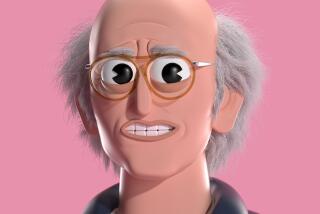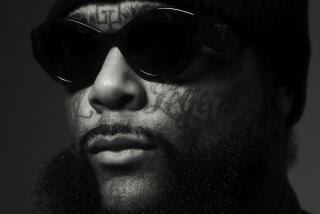Lance Loud, 50; Eldest Son in Real-Life PBS Series
- Share via
Lance Loud, the beguiling eldest son in a family whose conflicts were laid bare in a landmark 1973 public television documentary series, has died. He was 50.
Loud, a freelance journalist who had been living in Echo Park, died Saturday morning at a hospice in Los Angeles of complications from hepatitis C, his sister, Delilah, said Monday. With him at the time of his death, in addition to Delilah, were his mother, Pat, and sister Michele.
Loud emerged as a protagonist in “An American Family,” the controversial PBS series that was a progenitor of today’s unscripted programming. A real-life soap opera, it was the television sensation of 1973.
The series examined the Louds of Santa Barbara, who had allowed documentarians to trail them in their daily lives for seven months in 1971.
The result was a prime-time, 12-part series that drew record audiences for public television stations with its revelations: from father Bill’s philandering and wife Pat kicking him out of the house, to then-20-year-old Lance declaring himself gay in a rundown New York hotel.
His public avowal, quite bold for the times, made him a hero in the gay community. But in other quarters he and the rest of the family were ridiculed for participating in what has been called the most expensive home movie in history.
“In 1970, television ate my family,” Lance Loud wrote many years later. “The Andy Warhol prophecy of 15 minutes of fame for any and everyone blew up on our doorstep.”
The documentary was conceived by producer Craig Gilbert, who had made his reputation on such films as “The Triumph of Christy Brown” and “Margaret Mead’s New Guinea Journal.” Perplexed by the tensions he sensed growing in the American family, he decided to focus on one household, theorizing that if a camera stayed with it long enough “something important would be revealed about why men and women in their various roles were having such a difficult time in America during the early 1970s.”
Gilbert was inspired to look for his subjects in California after reading a Ross MacDonald novel, “The Underground Man,” which described just the sort of fragmented family he had in mind. He contacted MacDonald, who lived in Santa Barbara, and eventually found his way to the Louds.
Bill Loud owned a successful company that provided replacement parts for strip-mining equipment. His wife was a homemaker who watched over Lance and his four teenage siblings--Kevin, Delilah, Grant and Michele. They seemed quintessentially Californian, with a rambling ranch home, a pool, a golf club, four cars, three dogs, two cats and a horse.
Had Learning Woes and Felt Unpopular
Lance, the firstborn, moved with his parents from La Jolla to Eugene, Ore., when he was an infant. He had learning problems as a child and grew up feeling “fiercely unpopular,” he told Rolling Stone magazine in 1973. The family moved to Santa Barbara when he was about 10.
By 14 he had dyed his hair silver in homage to his idol, Warhol. In the series, he is shown wearing blue lipstick and giving his sisters makeup tips.
The cameras followed when he moved to New York to take up a gay lifestyle. The series also chronicled his mother’s concern, showing her take a room in the same seedy hotel as her son and spending a week with him and his friends. One of the first things he does is take her to a transvestite variety show.
Loud is seen telling her how he felt “like a little mouse trapped in a box” back in Santa Barbara. “There’s always been something in me I could never understand,” he says. When she leaves for home, the camera shows him climbing an endless flight of stairs.
The documentary, whittled down from 300 hours of footage, came as a shock to the Louds, who “thought we were going to become the all-American California family,” Bill Loud said in 1982. Instead, he remarked, “We came out as the super tragedy.”
By the time the series was aired, the elder Louds has been divorced. Family members were publicly ridiculed for their inability to communicate with one another and went on the talk-show circuit to defend themselves. Gilbert also came in for criticism, accused of twisting the material to fit his own agenda.
But “An American Family,” made in unflinching cinema verite style, was seen as breaking important new ground. Even Mead, the famous anthropologist, weighed in, pronouncing the documentary “as important for our time as were the invention of drama and the novel for earlier generations: a new way to help people understand themselves.”
Everyone seemed to have an opinion of Lance Loud, who dominated the series along with his mother. New York Times reviewer John J. O’Connor said that, unlike his parents and siblings, “Only Lance seems to be asking some of the right questions, and the lack of immediate answers is propelling him toward obnoxious selfishness, toward escapist fantasy. . . .”
Loud remained in New York for several years, living in a Lower East Side apartment and performing in a rock band called the Mumps. Although he had what a Washington Post critic described as “an ineffable star quality,” his group played small clubs without great success.
In 1981, he moved back to California, where he studied journalism. He was a regular contributor to such publications as the Advocate, Details and Interview.
He also had a few small television and film roles as an actor. He was a presence in Los Angeles’ gay community but shed his earlier flamboyance, saying he had “gone back into the closet; no more blue lipstick.”
Over the years, he spent time working with animal rescue organizations. He particularly loved cats and kept 10 in his home, Delilah said Monday.
“There wasn’t a stray cat in the neighborhood that he didn’t take in and spay, neuter, vaccinate and love unconditionally,” she said. Other members of the family joined his cat crusade, with his mother taking four of his homeless cats and his sister Michele taking three.
Whenever “An American Family” was rebroadcast, Lance was cast back into the spotlight. A one-hour sequel, “An American Family Revisited: The Louds 10 Years Later,” appeared on HBO in 1983.
His mother reviled the original series, telling an interviewer once that she felt disgraced by it--”like letting your pants down in public.” She and other family members felt that critics and viewers misunderstood them.
“People were shocked. And we were shocked that they were shocked,” Lance Loud recalled in an interview for the Assn. of Independent Video and Filmmakers a few years ago. “We thought people would be on our side and sympathize with the piece. But . . . they misunderstood it, thinking that we were arrogant in our stupidity. They were totally wrong.”
Nonetheless, Loud often seemed puzzled by the notoriety accorded him by the series, which, he wryly observed, had “raised my family to the status of a recurring question on ‘Hollywood Squares.’ ”
He hoped that the long lens of time would remove whatever tarnish remained on the family’s image.
“Maybe,” he said, “it will be viewed . . . that what we did was noble.”
He is survived by his parents and siblings.
The family requests that donations be made in his name to the AIDS Healthcare Foundation, 6255 W. Sunset Blvd., Los Angeles, CA 90028.
A memorial service is pending.
More to Read
The complete guide to home viewing
Get Screen Gab for everything about the TV shows and streaming movies everyone’s talking about.
You may occasionally receive promotional content from the Los Angeles Times.







